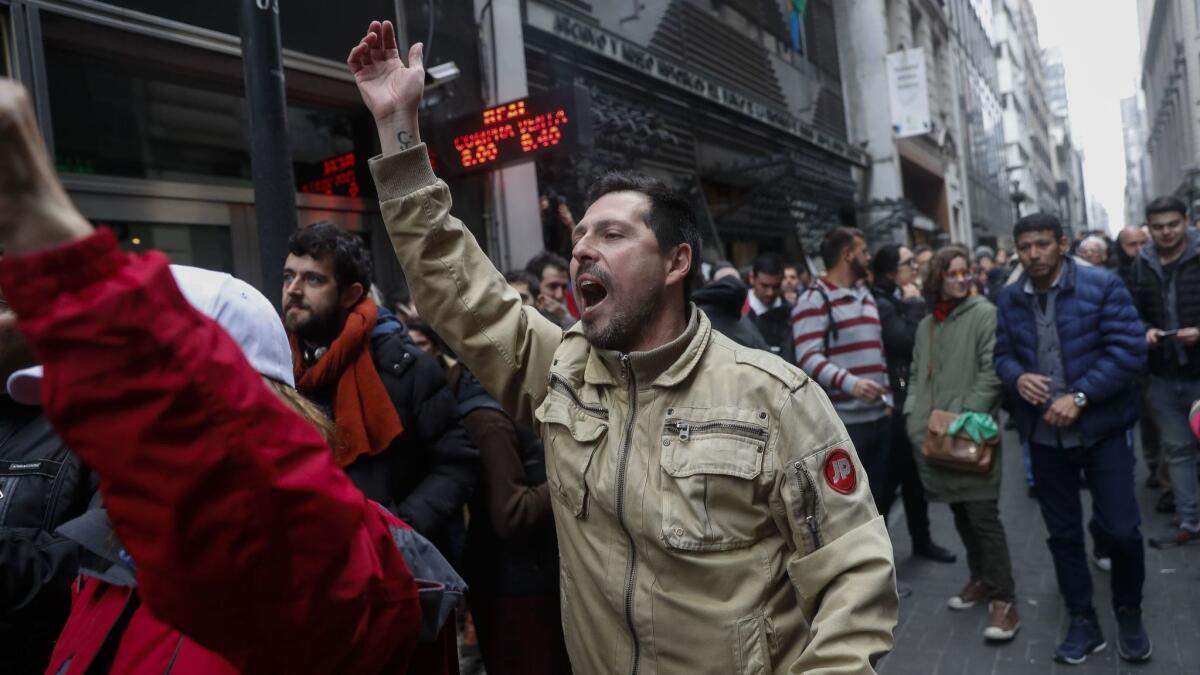Judgment day awaits for plan to avert Argentine economic crisis

- Share via
Argentine President Mauricio Macri has a tense night ahead of him waiting for U.S. markets to reopen Tuesday after the Labor Day holiday. That’s when investors will give the thumbs up or down to his proposals to save the economy from crisis.
The government announced emergency measures Monday including new export taxes in an attempt to regain investor confidence after the peso tumbled 25% last month. Trading in the currency on Monday was too thin to judge if the plan was a success or not. That verdict will come Tuesday.
As investors give their response, Treasury Minister Nicolas Dujovne will be meeting with International Monetary Fund Director Christine Lagarde in Washington to request faster payments from a $50-billion credit line. While the IMF response to Macri’s proposals may be positive, the market reaction is less clear. Early reviews on Monday of the new measures were mixed.
“They’re a positive step,” said Graham Stock, senior sovereign strategist for emerging markets at $60-billion BlueBay Asset Management in London. “I expect the IMF response to be broadly favorable but we need to see details including the revised monetary targets.”
Others were less enthusiastic.
“I didn’t see any magic bullets in today’s speeches,” said Guido Chamorro, London-based senior investment manager at Pictet Asset Management, who pointed to a recent survey that said that most investors in euro-debt are overweight Argentina. “It’s unclear who is left to buy bonds.”
In a presentation Monday, Treasury Ministry officials said Argentina has $28.3 billion in financing needs for 2019. Those payments will be met by rolling over bonds worth $12 billion and IMF loans of $11.7 billion, while other global financial institutions cover the rest.
With U.S. markets closed, volume on foreign exchange markets was low. That didn’t stop the central bank from selling $100 million at an average price of 37.9780 per dollar just before the market closed. The Merval stock index fell 1.7%.
Macri plans to halve the number of ministries and impose the levies on exports in an attempt to balance the budget by 2019, a year earlier than previously expected. The measures come on top of a previously announced government hiring freeze and reduced subsidies on utilities like electricity. The subsidy cutbacks have become a source of anger for Argentines as they face soaring bills while wages fail to keep up with price increases.
The backdrop to all these emergency measures is an economy heading for its second recession in three years. Even before a sharp sell-off in the peso last week, Dujovne said Argentina would contract at least 1% this year.
Moreover, consumer prices are rising above 30%, a far cry from the government’s initial inflation target of 15%. The peso is down more than 50% this year, the worst performing currency in emerging markets.
The announcement marked the first time since the turmoil began that Macri took measures “of the same scale as the crisis,” according to local consulting firm Delphos Investment. The next test will be his coalition’s ability to include cuts to public spending in the 2019 budget, which will be submitted to congress this month.
“We still have serious doubts” about bipartisan support, analysts at Delphos wrote in a note. “This may be a key determining factor to the success of the plan, especially with a government that doesn’t have congressional majorities.”
More to Read
Inside the business of entertainment
The Wide Shot brings you news, analysis and insights on everything from streaming wars to production — and what it all means for the future.
You may occasionally receive promotional content from the Los Angeles Times.










